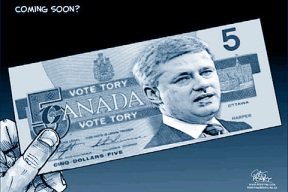Part II: Party Advertising

When an election is called and the candidates are running for office, their platform is of interest to viewers and readers.
The news media will report what they say.
That’s called “news”.
Political parties don’t need to buy advertising. Or at least they shouldn’t have to.

Why do the political parties expend so much energy fund raising to purchase advertising when they can get news coverage for free?
What’s the difference between media news coverage and advertising?
News coverage
is supposed to present the facts. News coverage might cover a press conference and select key statements made by a politician to put in the broadcast, or perhaps make a documentary about an issue, candidate, party or a campaign. They might include a panel discussion, a public consultation, or a political debate.
What is covered and the focus is decided by the news media editorial department, not the political party.
Realistically, the news media is at least partially entertainment, and like anything else carries bias. The bias may be an official policy of the news outlet, or it might be handed down from on high, or it may have developed based on the bias of the people in editorial department, or even informed by the readership. When there is bias, and there is always bias (it’s only human) how the politician or issue is presented will be influenced by that bias to a degree. If the media takes a shine to a politician, they will be careful to present them in a good light, but if they dislike someone, they have the power to show only unflattering angles and emphasize verbal stumbling or contradictions.
The news media will report what they say. Good and bad.
Thus the politicians and/or the political party can not dictate the “spin”.
Advertising Coverage
 To sell a product: in this case, the politician or the party, nothing works like advertising.
To sell a product: in this case, the politician or the party, nothing works like advertising.
Facts are not necessary, the only goal is to make the politicians or the party look good.
Political Party advertising doesn’t have to actually say anything. In fact it is probably better if it doesn’t.
You want your candidate to look their best, and because you can take as long as you need to get it right, your candidate WILL look their best. Photo Ops are good… baby kissing, cuddling pets, whatever works.
Then there are attack ads designed to make the opposing candidate or party look bad. I think the assumption is that if the other guy looks bad, our guy looks good. Unfortunately, these ads don’t come across as “whistle blowing”, they look much more like bullying. I guess that might work for the bullies of the world, but I think this kind of advertising makes the party paying for it look bad.
I don’t need you to tell me what the other party has done wrong, I need to know what you will do right.
Advertising must be paid for. So yes, the parties need to find the money– this is what they are fund raising for.
Because they pay for the ads, they are the client. Thus the politicians and/or the political party have control over the “spin”. Advertisements only tell us what the party wants us to know. So advertising is good for the party, but not necessarily good for the voter.
Is this really how we want to select our government? Based on how good their advertising campaign is?
money and money

There are two different ways advertising money needs to be spent. The obvious part is the money that is spent on the creation of the advertising materials… the writers, producers, actors, camera men…
We don’t often think of the other place advertising money goes… to the media outlets. Space has to be purchased from magazines and newspapers to run print ads, while time slots must be bought from radio and television in order to broadcast commercials.
Political advertising represents an enormous revenue stream for media outlets. The income generated is what pays for the news media. Do you think maybe a TV network that receives a great deal of advertising revenue from a particular political party might be influenced in what news coverage that party receives? Is it unreasonable to think that large advertising budgets may lead to more favorable news coverage for the political parties?
Those are scary enough prospects to begin with, but the one that bothers me the most was the article I read in yesterday’s The Hill Times:
Right now the party is working on solidifying its policy positions, and boosting revenues from fundraising. The Liberals raised $9.6-million in 2009, which is vastly improved from 2008 when they brought in only $5.6-million. But while the Tories’ fundraising haul declined from $21-million in 2008, they were still light years ahead of the other parties, bringing in $18-million last year.
When Mr. Apps became president of the party last year he pledged to match the Conservatives in fundraising by June 30, 2011, and he said the party is on track to meeting that goal.
“In one year we’ve cut the gap in half. If I can cut it in half again this year, so the gap instead of being under $8-million it becomes $4-million, I think it’s very achievable to meet that goal in 2011,” he said.
But the Liberals are not there yet, and after four years in opposition, they have learned to fear the Conservative machine, said one insider.
—The Hill Times: Liberals not ready to defeat Tories in spring

The upshot certainly seems to be that The Liberal party is afraid to challenge the Conservative party and possibly trigger an election.
Not because they don’t think they are in the right. But for one reason only: they don’t believe they have enough money for advertising, and therefore believe that they cannot win.
Is it really true that our Canadian democracy boils down to the party with the biggest advertising budget will win?
More than anything that is a sign that political advertising needs to be stopped.

If I ran the Zoo er Country…
the only advertising I would allow political parties to engage in would be lawn signs. If the party wanted to appear in the media the candidates would have to do something newsworthy.
Maybe if we got beyond sound bites we could find out what the different parties actually stand for. Instead of throwing all their creative juices into fooling us into voting for them, maybe they could really find out about the issues, and maybe even engage in public consultations and come out with workable platforms.
That’s what I would do if I ran the zoo country.
Write to your Member of Parliament and tell them what you think about premature prorogation or anything else! You can find your MP with this lovely link – it will also help you find out who your MP is if you don’t know. It’s time that Canadians started letting them know what we think about how they represent us.
Find your Member of Parliament
Write to Prime Minister Stephen Harper and tell him too!
Prime Minister/Premier Ministre Stephen Harper <pm@pm.gc.ca>
The government gives more weight to postal mail: you can mail your comments without a stamp!!:
The Right Hon. Stephen Joseph Harper, P.C., B.A., M.A.
1600 90th Avenue Southwest, suite A-203
Calgary, Alberta
T2V 5A8
Canada badly needs electoral reform. Take a peek at the Non-Partisan Fair Vote Canada site to get information some ideas of electoral reform. All Canadians need to join in these non-partisan discussions.
